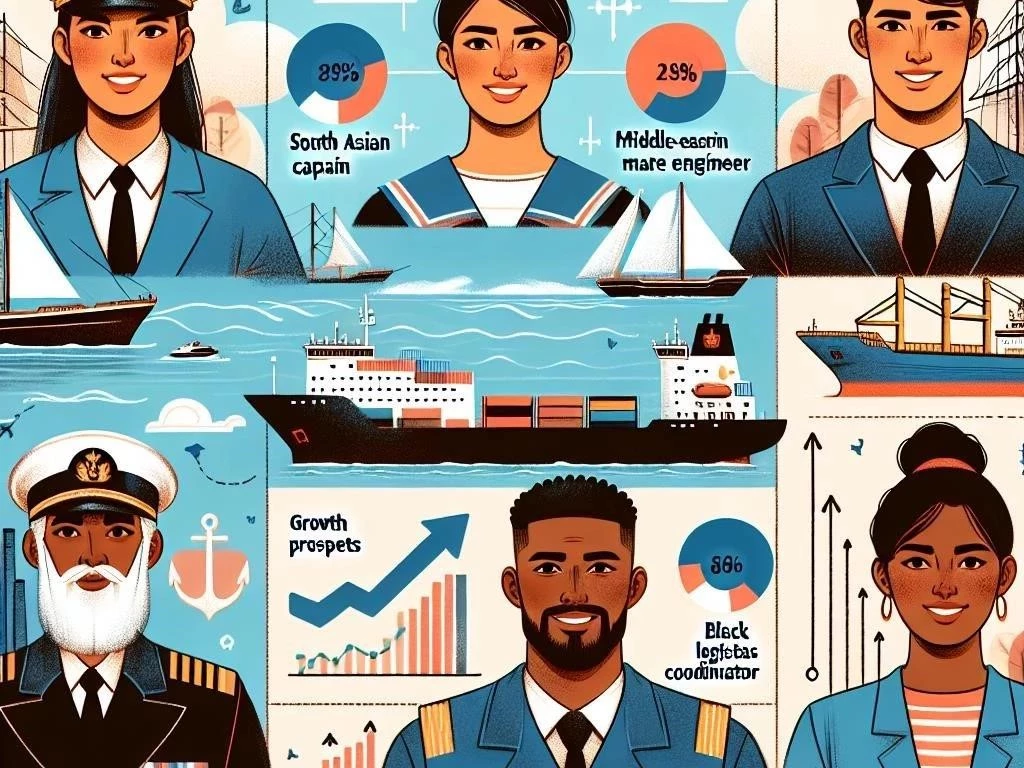Is Marine Transportation a Good Career Path?
Choosing marine transportation can offer intriguing career opportunities. With diverse roles in logistics management, maritime safety, and environmental impact, this industry provides job security, competitive salary expectations, and exciting prospects for career advancement.
Marine transportation plays a crucial role in international trade, connecting global markets through the movement of goods across oceans and waterways. This industry encompasses various sectors, including shipping, logistics management, and naval engineering, offering diverse career opportunities. As a vital component of the maritime industry, marine transportation enables efficient supply chain operations, ensuring timely delivery of goods and services. The demand for skilled seafarers, vessel operations managers, and cargo handling specialists continues to rise, creating a robust job market for aspiring professionals.
Furthermore, the focus on maritime safety, environmental impact, and compliance with maritime law enhances job security within this field. Training programs and maritime academies provide essential education and hands-on experience, preparing individuals for successful careers. With competitive salary expectations and opportunities for career advancement, marine transportation not only offers a rewarding profession but also promotes a healthy work-life balance. Overall, this dynamic industry is an excellent career path for those seeking a fulfilling and impactful role in global commerce;
Overview of the Maritime Industry
The maritime industry is a multifaceted sector that encompasses a wide range of activities related to marine transportation, shipping, and logistics. This industry is vital for global trade, as approximately 90% of the world’s cargo is transported via sea routes. It includes various components such as vessel operations, cargo handling, port operations, and fleet management, each of which plays a significant role in ensuring efficient movement of goods. The industry is also heavily influenced by international trade policies and maritime law, which regulate shipping practices and promote maritime safety.
As globalization continues to expand, the demand for skilled professionals in the maritime industry has grown, leading to numerous career opportunities. Additionally, the focus on sustainability and reducing the environmental impact of shipping operations is driving innovation and creating new jobs in green technology and marine logistics. With advancements in navigation systems and ship management, the maritime industry is evolving, offering exciting prospects for individuals interested in a career path that combines adventure with impactful work.
Career Opportunities in Marine Transportation
Marine transportation offers a diverse array of career opportunities that cater to various skill sets and interests. For those passionate about logistics management, roles like supply chain coordinators and logistics analysts are essential for ensuring the smooth flow of goods. Seafarers, responsible for operating vessels, are in high demand, contributing to vessel operations and cargo handling. These positions often require specialized training but provide rewarding experiences and competitive salaries.
Additionally, careers in naval engineering focus on designing and maintaining ships, while maritime safety professionals ensure compliance with safety regulations and enhance operational efficiency. Management roles in shipping companies and port operations provide opportunities for career advancement, often leading to positions in executive leadership. The industry also supports offshore careers, where professionals work on oil rigs and other maritime platforms. With a growing emphasis on environmental sustainability, new roles in marine logistics and green technology are emerging. Overall, the varied career paths within marine transportation make it an attractive and promising field for aspiring professionals.
Types of Shipping Jobs
The marine transportation sector offers a variety of shipping jobs, each catering to different skills and interests. Among the most common roles are ship captains and officers, who are responsible for navigation and vessel operations. These individuals ensure that ships are operated safely, adhering to maritime laws and regulations. Additionally, there are roles for maritime engineers and technicians focused on the maintenance and repair of vessels, ensuring they are seaworthy and efficient.
Logistics coordinators play a vital role in managing the flow of cargo, overseeing shipping schedules, and coordinating with port operations. Moreover, positions such as freight forwarders and customs brokers facilitate the movement of goods across international borders, ensuring compliance with trade regulations. There are also opportunities in cargo handling, where professionals manage the loading and unloading of goods at ports. As the industry evolves, new roles in marine technology and sustainability are emerging, reflecting the growing emphasis on reducing environmental impact. Overall, the diverse shipping jobs available make marine transportation an appealing career choice.
Logistics Management in Marine Transportation
Logistics management in marine transportation is essential for optimizing supply chain efficiency. It involves coordinating shipping schedules, managing cargo flow, and ensuring compliance with regulations, creating significant career opportunities in this dynamic and growing industry.
Importance of Supply Chain in Marine Logistics
The supply chain plays a crucial role in marine logistics, serving as the backbone of the entire maritime transportation process. By efficiently managing the flow of goods from manufacturers to consumers, the supply chain ensures timely deliveries and minimizes costs. It encompasses various stages, including procurement, transportation, warehousing, and distribution. In marine logistics, this translates to coordinating shipping schedules, optimizing cargo handling, and managing port operations.
Effective supply chain management in marine logistics enhances operational efficiency while also addressing challenges such as fluctuating fuel prices and fluctuating demand. It promotes collaboration among stakeholders, including shipping companies, freight forwarders, and customs authorities, fostering a seamless movement of goods. Additionally, with the growing emphasis on sustainability and reducing the environmental impact of shipping, innovative supply chain practices are emerging, creating new career opportunities within marine transportation. Professionals skilled in supply chain management can expect to find various roles, from logistics coordinators to supply chain analysts, making this field an attractive option for those seeking a rewarding career path.
Role of Naval Engineering in Marine Careers
Naval engineering plays a pivotal role in marine transportation, focusing on the design, construction, and maintenance of ships and marine vessels. This specialized field combines principles of engineering, physics, and mathematics to ensure that vessels operate efficiently, safely, and sustainably. Naval engineers are responsible for developing innovative solutions to enhance vessel performance, improve fuel efficiency, and reduce environmental impact, which is increasingly important in today’s maritime industry.
By pursuing a career in naval engineering, individuals can engage in exciting projects, from designing cutting-edge cargo ships to retrofitting existing vessels for improved performance. This field offers diverse opportunities, including roles in ship design, marine systems, and research and development. Furthermore, naval engineers often collaborate with professionals in related areas such as logistics management, maritime safety, and environmental compliance, enhancing the interdisciplinary nature of marine transportation careers. With a growing demand for skilled engineers in the maritime sector, pursuing a career in naval engineering not only offers job security but also presents avenues for career advancement and personal fulfillment;
The Life of a Seafarer
The life of a seafarer is adventurous yet demanding, involving long periods away from home. With responsibilities in vessel operations and maritime safety, seafarers enjoy competitive salaries and unique experiences while contributing significantly to global trade.
Vessel Operations and Cargo Handling
Vessel operations and cargo handling are critical components of marine transportation, ensuring that goods are efficiently loaded, transported, and unloaded across global trade routes. Professionals in this field manage a variety of tasks, including overseeing the operation of ships, coordinating loading and unloading processes, and ensuring compliance with safety regulations. These roles often require specialized training and knowledge of maritime safety protocols, as well as familiarity with the equipment and technology used in cargo handling.
Individuals involved in vessel operations must possess strong problem-solving and communication skills to collaborate effectively with crew members, port authorities, and logistics teams. Additionally, understanding the intricacies of shipping schedules and cargo logistics is essential for optimizing efficiency and reducing costs. As the demand for skilled workers in vessel operations and cargo handling continues to grow, numerous career opportunities arise, ranging from deck officers to cargo supervisors. This sector not only offers competitive salaries and job security but also provides a dynamic work environment, making it an attractive career path for those passionate about marine transportation.
Offshore Careers in Marine Transportation
Offshore careers in marine transportation present unique opportunities for individuals interested in working at sea, particularly in industries such as oil and gas exploration, renewable energy, and marine research. These roles often involve operating vessels designed for offshore activities, including drilling rigs, supply ships, and specialized support vessels. Professionals in this field may find themselves engaged in various tasks, from managing logistics and cargo operations to ensuring compliance with safety and environmental regulations.
Working offshore typically involves extended periods away from home, requiring adaptability and resilience. However, the rewards can be significant, with competitive salaries and the chance to gain hands-on experience in challenging environments. Positions such as offshore engineers, marine technicians, and safety officers are in high demand, reflecting the growth of offshore operations. As industries increasingly focus on sustainable practices, opportunities in offshore wind energy and marine conservation are also emerging. Overall, offshore careers in marine transportation offer fulfilling pathways for those seeking adventure while contributing meaningfully to global energy and environmental initiatives.
Navigating Maritime Safety
Navigating maritime safety is essential in marine transportation, ensuring the well-being of crews and protecting cargo. With increasing regulations and safety standards, careers in this area offer job security and significant contributions to industry safety.
Understanding Port Operations
Understanding port operations is crucial for those pursuing a career in marine transportation, as ports serve as vital hubs for the movement of goods in international trade. Port operations involve various activities, including cargo handling, vessel scheduling, and customs clearance, all of which contribute to the efficiency of the supply chain. Professionals in this field work collaboratively with shipping companies, freight forwarders, and regulatory agencies to ensure that the flow of goods is seamless and timely.
Port managers, logistics coordinators, and customs brokers are among the key roles within port operations, each requiring specialized knowledge and skills. These positions often demand a deep understanding of maritime law and safety regulations to ensure compliance and minimize risks. Additionally, advancements in technology are transforming port operations, leading to the adoption of automated systems and enhanced tracking capabilities, creating new career opportunities. As global trade continues to expand, the demand for skilled professionals in port operations is expected to grow, making this sector an attractive option for those seeking a stable and rewarding career path in marine transportation.
The Impact of Maritime Law on Careers
Maritime law significantly influences various careers within the marine transportation sector, establishing the legal framework governing shipping activities, vessel operations, and international trade. Professionals engaged in this industry must understand relevant regulations to ensure compliance, mitigate risks, and protect their organizations from potential legal issues. Maritime law encompasses diverse areas, including shipping contracts, cargo claims, environmental regulations, and maritime safety standards, all of which require specialized knowledge and expertise.
Careers in maritime law, such as maritime attorneys and legal consultants, are essential for navigating complex legal landscapes, helping businesses understand their obligations and rights under international conventions and national laws. Additionally, professionals in maritime safety and compliance roles must stay informed about evolving regulations to maintain operational integrity and ensure the safety of crews and cargo. With the ongoing focus on environmental sustainability and safety, the demand for legal expertise in maritime matters is expected to grow. Consequently, individuals pursuing careers in marine transportation can find rewarding opportunities at the intersection of law, safety, and operational excellence within the maritime industry.
Job Security and Salary Expectations
Marine transportation offers job security due to growing global trade demands. Competitive salary expectations vary by role, with opportunities for advancement, making this industry an attractive choice for those seeking stable and rewarding careers.
Training Programs and Maritime Academies
Training programs and maritime academies play a crucial role in preparing individuals for successful careers in marine transportation. These institutions offer specialized education and hands-on training in various fields, including naval engineering, logistics management, and maritime safety. Students receive comprehensive instruction in essential topics such as vessel operations, cargo handling, and maritime law, equipping them with the knowledge and skills necessary to excel in the industry.
Many maritime academies provide practical training through internships and cooperative education programs, allowing students to gain valuable real-world experience while developing professional networks. Additionally, specialized certifications in areas like safety management and navigation enhance employability and career advancement potential. As the marine transportation sector continues to evolve, continuing education opportunities are essential for professionals seeking to stay current with industry trends and regulations. By investing in their education through training programs and maritime academies, individuals can position themselves for rewarding careers in a dynamic field. Overall, the strong emphasis on training and education in this industry contributes significantly to job security and growth potential.
Work-Life Balance in Marine Transportation Careers
Work-life balance in marine transportation careers can vary significantly based on specific roles and job requirements. Many positions, such as those involving vessel operations or offshore work, often require extended periods away from home, which can impact personal life and family time. Seafarers may spend weeks or months at sea, followed by time off, providing a unique rhythm to their work-life balance. This arrangement allows for concentrated periods of work, followed by extended downtime, which can be appealing to some individuals.
Conversely, shore-based roles, such as logistics management or port operations, usually offer more traditional work hours, allowing for a better balance between professional and personal life. However, demands in the maritime industry can lead to irregular hours and unexpected challenges, impacting that balance. Ultimately, individuals considering a career in marine transportation should assess their priorities and preferences regarding work-life balance. With careful planning and communication, many professionals find fulfilling careers in the maritime sector while maintaining healthy personal lives, making this industry a viable career path for those adaptable to its demands.
The Role of International Trade in Marine Transportation
International trade significantly drives marine transportation, facilitating the exchange of goods worldwide. This sector creates numerous career opportunities, ensuring efficient logistics management and enhancing global supply chains, making it an attractive career path for many.
Fleet Management in the Maritime Industry
Fleet management is a critical aspect of the maritime industry, involving the oversight and coordination of a company’s vessels to ensure efficient operations and optimal performance. This role encompasses various responsibilities, including route planning, maintenance scheduling, and compliance with international regulations. Effective fleet management is essential for minimizing operational costs, maximizing cargo capacity, and enhancing overall service quality, which is vital in a competitive global market.
Professionals in fleet management must possess strong analytical and organizational skills, as they frequently evaluate vessel performance, fuel efficiency, and crew management. They also work closely with various stakeholders, including shipowners, operators, and regulatory bodies, to maintain safety and compliance standards. With the growing emphasis on sustainability, fleet managers are increasingly tasked with implementing environmentally friendly practices, such as adopting greener technologies and optimizing routes to reduce emissions. As the demand for skilled professionals in this area continues to rise, fleet management presents rewarding career opportunities within marine transportation, offering both job security and avenues for career advancement in a dynamic sector.
Career Advancement Opportunities
Career advancement opportunities in marine transportation are abundant, providing individuals with pathways to grow professionally and take on more significant responsibilities. As global trade continues to expand, the demand for skilled professionals across various sectors, including logistics, vessel operations, and maritime safety, is on the rise. Employees who demonstrate strong performance, adaptability, and a commitment to continuous learning can expect to see numerous opportunities for upward mobility.
Many organizations support career growth through training programs, mentorship initiatives, and educational resources that empower employees to acquire new skills and certifications. For example, individuals can advance from entry-level positions to managerial roles, such as logistics manager or port operations supervisor, with experience and additional qualifications. Moreover, specialized roles in areas like naval engineering or maritime law can also lead to significant career growth and increased earning potential.
Networking within the industry is essential for career advancement, allowing professionals to connect with peers and leaders who can offer valuable insights and opportunities. Overall, marine transportation offers a promising career path with numerous avenues for growth and development.
Current Job Market for Marine Transportation Careers
The current job market for marine transportation careers is robust, with increasing demand for skilled professionals; Diverse opportunities exist across various sectors, offering competitive salaries and job security, making this field an appealing career choice.
Deciding whether marine transportation is the right career path for you involves careful consideration of personal interests, skills, and lifestyle preferences. This dynamic industry offers numerous opportunities across various sectors, including logistics management, vessel operations, and maritime safety. Those who thrive in fast-paced environments, enjoy problem-solving, and have a passion for international trade may find fulfilling careers within this field.
Moreover, the marine transportation industry provides job security and competitive salaries, making it an attractive option for many. However, it’s essential to weigh the demands of specific roles, such as extended periods at sea for seafarers or irregular hours for shore-based positions. Training programs and maritime academies equip individuals with the necessary skills and knowledge, enhancing employability and career advancement potential.
Ultimately, if you are adaptable, open to continuous learning, and passionate about contributing to global trade and environmental sustainability, marine transportation can be an excellent career choice. Assessing your priorities and aligning them with industry opportunities will help you make an informed decision.














Post Comment